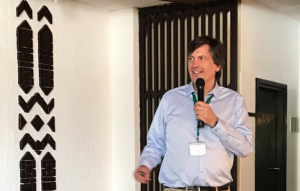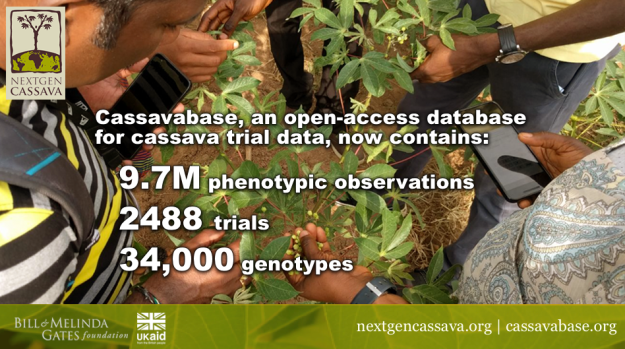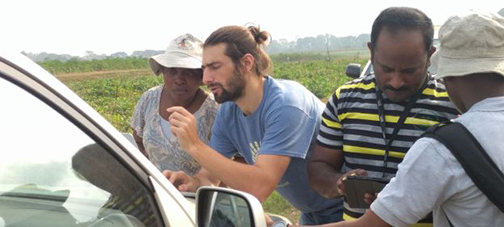The Boyce Thompson Institute (BTI) based in Ithaca, New York, is one of the founding partners of the NextGen Cassava project. Researchers at BTI code and maintain Cassavabase, an open-access database where cassava breeders can upload the genetic and phenotypic data from their field trials and access data from other breeders around the world.
Establishing a centralized database for information tracking, genotypic and phenotypic data, and Genomic Selection (GS) prediction analyses was one of the main objectives of NextGen Cassava in Phase 1. Moving into Phase 2, Cassavabase will continue to develop in response to the feedback and needs of breeders. We interviewed Guillaume Bauchet and Lukas Mueller of BTI to learn more about the institute, their work, and how they fit into the NextGen Cassava project.
What is BTI’s role in NextGen Cassava? What are the main activities/objectives being accomplished here?
BTI’s main role in NextGen Cassava is developing the Cassavabase site as a one-stop shop for NextGen’s breeding data. Our main activities include:
- Managing data: we handle NextGen’s phenotypic and genotypic data management
- Developing tools: we support breeders in their day to day activities through breeding database development
- Capacity building: we train and assist NextGen collaborators in analyzing and bioinformatics.

Lukas Mueller of BTI delivered a presentation on Cassavabase at the 2018 Global Cassava Partnership for the 21st Century Conference in Couteau, Benin. Photo by Canaan Boyer.
Are there any Masters/PhD students funded by NextGen at BTI? What is their work focused on?
Currently, there are no Masters/PhD students funded by NextGen at BTI, but we have a lot of institutional representatives involved as data managers/data analysts.
Has the partnership/involvement with NextGen benefited BTI? In what ways?
NextGen has been an eye-opener on African agriculture and certainly a great asset to BTI. It has allowed us to see current and future plant research challenges and opportunities.
How does NextGen fit into BTI’s overall mission and goals?
BTI’s aim is to make valuable contributions to general scientific knowledge, biology, and medicine. William Boyce Thompson, BTI’s founder, was convinced that “agriculture, food supply, and social justice are linked.” This is also true of the future of the African continent.
From its creation, BTI’s mission encompasses the “creation through genetic research of hardier, more nutritious, disease-resistant crop plants and more viable seeds; the study of insects that damage food crops; and the production of new pesticides.”

As of the end of Phase 1, Cassavabase hosts a great amount of data related to cassava trials.
With NextGen, developing a breeding database for Africa’s major staple crop is fully in line with BTI’s vision and institutional missions.
How do you see NextGen and BTI’s partnership moving forward?
Developing the “digital ecosystem” around breeding is a continuous, major goal within NextGen where BTI’s contribution is significant.
This will work in conjunction with new research activities developed in Phase 2, such as farmer’s knowledge, food preferences, and related methods/technologies (surveys, near-infrared spectroscopy) to tackle underlying research questions.






